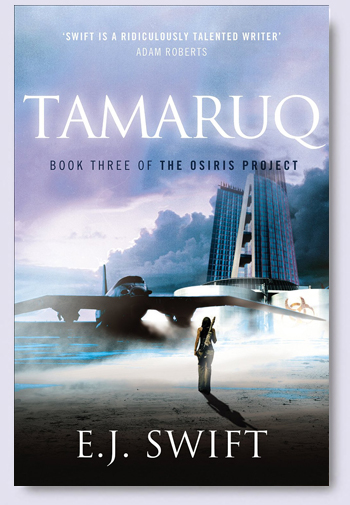One
of the biggest challenges in writing a trilogy has been to give each book its
own distinctive feel, whilst staying true to the themes and characters which
have evolved over the overarching story.
When
I first wrote Osiris, it was very
much an isolated project. I had a hazy concept of where future sequels might
lead, if required, but no long-ranging plotline - all I knew was that I didn’t
want to set three books in the same location. In some ways, this allowed me a
lot of freedom, because I wasn’t bound to any preconceived ideas. But it also
meant I was embarking on the second two books in the dark.
Osiris, book one of The Osiris Project and the name of the eponymous ocean
city, explores a divided society whose inhabitants believe they are the last on
earth. My image of Osiris was clear from the start: I had a sense of a very
cold, very hostile environment; a lonely place built in the open ocean. The
city’s environment inevitably impacts on the mental state of its citizens, from
idle speculation as to what might be out there, to Adelaide’s missing twin
Axel, who has slowly withdrawn from society, becoming a recluse, and is plagued
by hallucinations.
When
it came to Cataveiro, I knew I
needed to widen the story and move away from the city. The events of Cataveiro take place in a Patagonia radically altered by
climate change, a country all-but-abandoned by the powerhouses in the north
(the Boreal States) and south (the Republic of Antarctica), and generally regarded
as an information exchange and opium factory. In this world, the power of
story-telling is integral as a part of culture and as currency, and the city of
Osiris is believed lost, reduced to a myth. For inspiration, I looked to
Spanish- and Portuguese-language writers such as Angélica Gorodischer, Roberto
Bolaño, Bernardo Carvalho and Silvina Ocampo, to name just a few. I’d
particularly recommend Gorodischer’s Kalpa Imperial which is a glorious piece of story-telling.
Tamaruq was a slightly different beast, and I found it the hardest to write.
Whereas books one and two can be read individually as standalones, Tamaruq draws together characters and storylines from both Osiris and Cataveiro, whilst also touching on areas of The Osiris Project world not
previously explored. The city of Osiris has become a pawn in a larger war,
caught between the ambitions of north and south. I’ve always been interested in
the language used to portray and justify war, and I wanted to explore the
impact on the individuals caught up on it, and how this affected their sense of
identity and belonging, as well as the wider politics involved.
Perhaps
one of the toughest things about concluding a trilogy is the sense that there
is so much more you could explore. I’ve loved developing the dystopian world of
The Osiris Project, and whilst this storyline is definitely concluded, perhaps
it’s something I’ll go back to one day… but not just yet.
Biography
E. J. Swift is the author of The Osiris Project trilogy (Del Rey
UK, Penguin Random House), a speculative fiction series set in a world
radically altered by climate change, comprising Osiris, Cataveiro and the just-published Tamaruq.
Her short fiction has appeared in anthologies from Salt Publishing, NewCon
Press and Jurassic London, including The Best British Fantasy (Salt Publishing, 2013 and 2014). She
was shortlisted for a 2013 BSFA Award in the Short Fiction category for her
story “Saga’s Children” (The Lowest Heaven, Jurassic).
Comments
Post a Comment